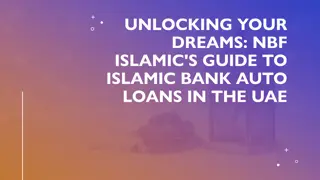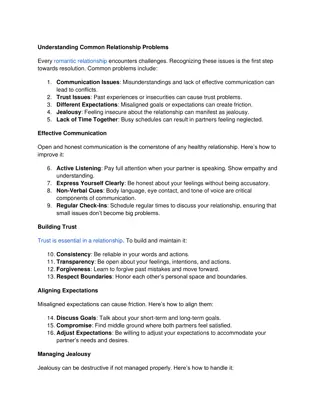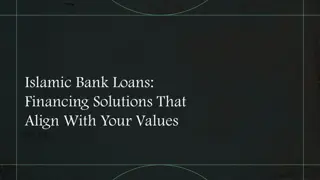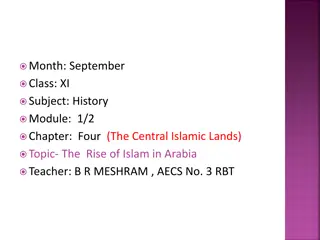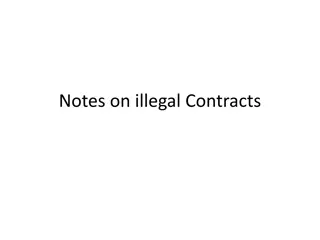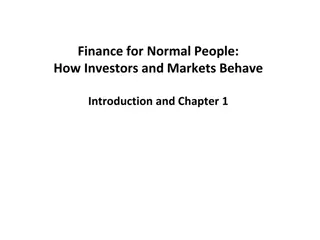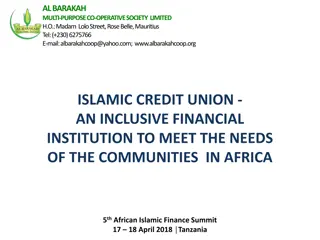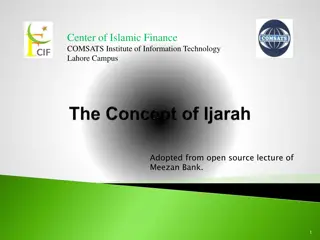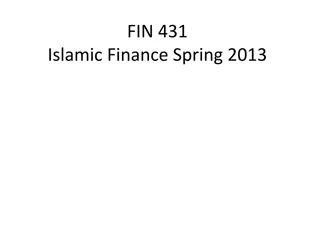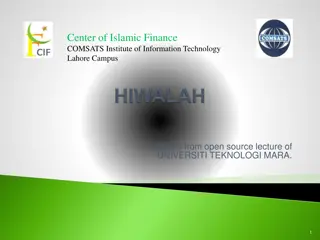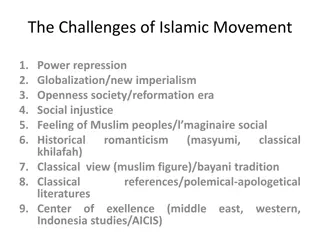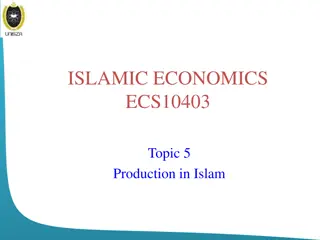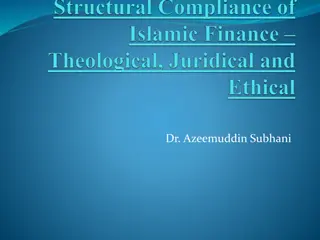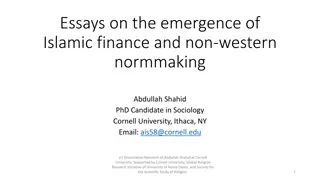Understanding Salam Contracts in Islamic Finance
Salam contracts in Islamic finance involve the advance payment for specific goods to be delivered at a future date. The buyer pays the price in full to the seller at the time of sale to meet the instant needs of sellers, such as small farmers or traders. Only goods with specified quantity and quality can be sold through a Salam contract, with clear details to avoid disputes. It is essential for the commodity's quantity, delivery date, and place to be agreed upon in absolute terms. Salam transactions aim to address the funding needs of various economic activities, but certain restrictions apply to ensure compliance with Islamic principles.
Download Presentation

Please find below an Image/Link to download the presentation.
The content on the website is provided AS IS for your information and personal use only. It may not be sold, licensed, or shared on other websites without obtaining consent from the author. Download presentation by click this link. If you encounter any issues during the download, it is possible that the publisher has removed the file from their server.
E N D
Presentation Transcript
Center of Islamic Finance COMSATS Institute of Information Technology Lahore Campus Adopted from open source lecture of Dr. Muhammad Imran Usmani 1
Seller undertakes to supply specific goods to the buyer at a future date in exchange of an advanced price fully paid at spot. Price is in cash but the supply of goods is deferred. 3
To meet the need of small farmers who need money to grow their crops and to feed their family up to the time of harvest. To meet the need of traders for import and export business. 4
It is necessary for the validity of Salam that the buyer pays the price in full to the seller at the time of effecting the sale. In the absence of full payment, it will be tantamount to sale of a debt against a debt which is expressly prohibited by the Holy Prophet. Moreover the basic wisdom for allowing Salam is to fulfill the instant need of the seller. If its not paid in full, the basic purpose will not be achieved. 5
Only those goods can be sold through a Salam contract in which the quantity and quality can be exactly specified eg. precious stones cannot be sold on the basis of Salam because each stone differ in quality, size, weight and their exact specification is not possible. Salam cannot be effected on a particular commodity or on a product of a particular field or farm e.g.. supply of wheat of a particular field or the fruit of a particular tree since there is a possibility that the crop is destroyed before delivery and given such possibility, the delivery remains uncertain. All details in respect to quality of goods sold must be expressly specified leaving no ambiguity which may lead to a dispute. 6
It is necessary that the quantity of the commodity is agreed upon in absolute terms. It should be measured or weighed in its usual measure only meaning what is normally weighed cannot be quantified and vice versa. The exact date and place of delivery must be specified in the contract. Salam cannot be effected in respect of things, which must be delivered at spot. The commodity for Salam contract should remain in the market right from day of contract up to the date of delivery or at least till the date of delivery. 7
The time of delivery should be at least fifteen days or one month from the date of agreement. Price in Salam is generally lower than the price in spot sale. The period should be long enough to affect prices. But Holy Prophet SAW did not specify any minimum period for the validity of Salam. It is all right to have a earlier date of delivery if the seller consents to it. Since price in Salam is generally lower than the price in spot sale; the difference in the two prices may be a valid profit for the Bank. A security in form of a guarantee, mortgage or hypothecation may be required for a Salam in order to ensure that the seller delivers. The seller at the time of delivery delivers commodities and not money to the buyer who would have to establish a special cell for dealing in commodities. 8
After purchasing a commodity by way of Salam, the financial institution can sell it through a parallel contract of Salam for the same date of delivery. The period of Salam in the second parallel contract is shorter and the price is higher than the first contract. The difference between the two prices shall be the profit earned by the institution. 9
The institution can obtain a promise to purchase from a third party. This promise should be unilateral from the expected buyer. The buyer does not have to pay the price in advance. When the commodity is received by the institution, it can be sold at a pre-determined price to a third party according to the terms of the promise. 10
In an arrangement of parallel Salam there must be two different and independent contacts; one where the bank is a buyer and the other in which it is a seller. The two contracts cannot be tied up and performance of one should not be contingent on the other. A Salam arrangement can not be used as a buy back facility where the seller in the first contract is also the purchaser in the second. Even if the purchaser in the second contract a separate legal entity but owned by the seller in the first contract; it would not tantamount to a valid parallel Salam agreement. 11
THANK YOU 12




